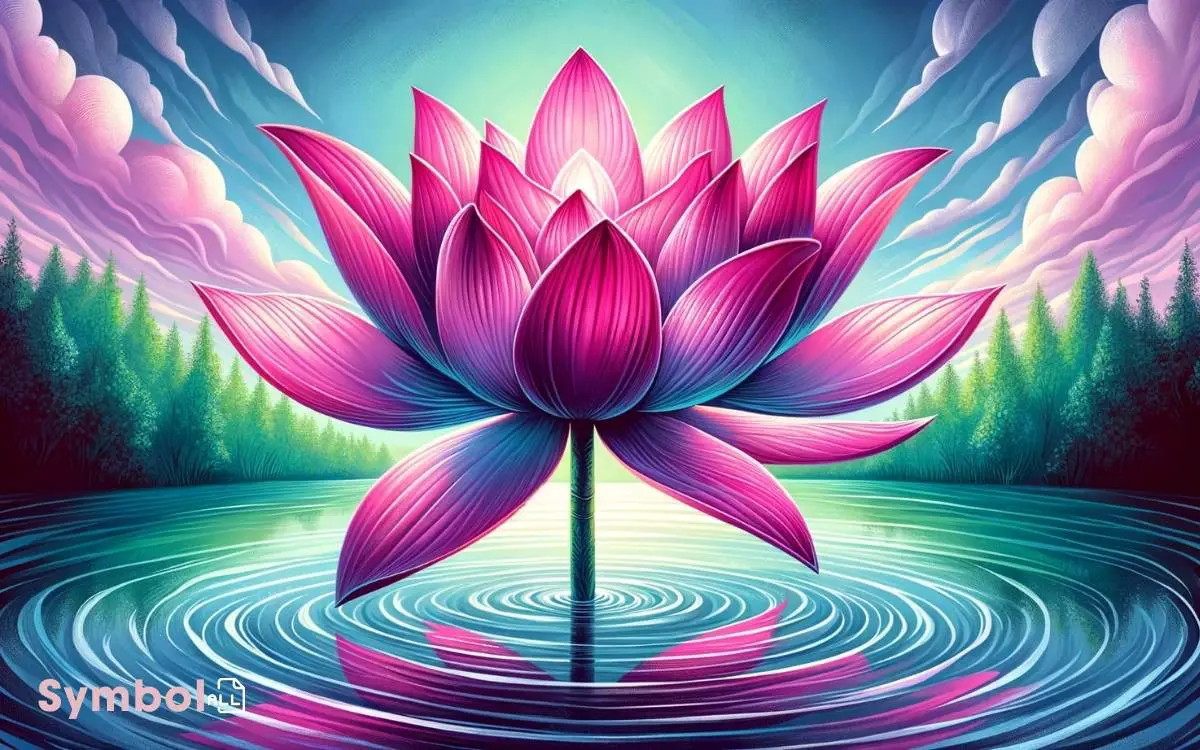Flower That Symbolizes Self Love: The Lotus!
The lotus symbolizes self-love, epitomizing purity and resilience in harsh conditions. Its biological makeup includes a self-cleaning mechanism, known as the lotus effect, which repels water and dirt, maintaining its integrity.
Historically, cultures around the world have revered the lotus. In Ancient Egypt, it represented creation; Buddhism associated it with spiritual awakening, and Hinduism with beauty and prosperity.
Cultivating a lotus requires calm, shallow waters and full sunlight, reflecting the care you should give yourself. As you integrate the lotus’s symbol of self-love into your life, you’ll uncover deeper layers of its significance and applications.

Key Takeaways
The Lotus: A Symbol
Among various symbols of self-love, the lotus stands out due to its unique ability to thrive in muddy waters, symbolizing purity and resilience amidst adversity. You’ll find its significance deeply rooted in its biological makeup.
The lotus, scientifically known as Nelumbo nucifera, exhibits a remarkable phenomenon known as the lotus effect. This refers to the plant’s ability to repel water and dirt from its leaves, thanks to microscopic structures that minimize surface adhesion.
This self-cleaning property guarantees the lotus remains pristine, despite its murky environment. It’s a vivid metaphor for maintaining one’s integrity and beauty in challenging situations.
For anyone seeking to embody self-love and personal growth, the lotus serves as a powerful emblem of overcoming obstacles and emerging stronger and more beautiful.
Historical Significance
Throughout history, the lotus has held profound symbolic value across various cultures, embodying concepts of purity, enlightenment, and rebirth. This flower’s historical significance isn’t only fascinating but deeply rooted in ancient traditions and beliefs. In ancient Egyptian mythology, the lotus was associated with the sun and creation, as it was believed to close at night and reopen with the sunrise, symbolizing renewal. In Hinduism and Buddhism, the lotus is revered as a symbol of spiritual awakening and detachment, flourishing in muddy waters yet remaining untouched by impurities. The lotus flower meaning in mythology transcends individual cultures, serving as a universal emblem of resilience and transcendence.
- In Ancient Egypt, the lotus was associated with the sun and creation, as it retracts into the water at night and emerges fresh in the morning.
- Buddhism regards the lotus as a symbol of spiritual awakening, its growth from muddy water representing the journey from ignorance to enlightenment.
- Hinduism sees the lotus as a symbol of beauty, prosperity, and fertility, with gods often depicted sitting on lotus thrones.
- In Chinese culture, the lotus represents purity and elegance, often associated with high moral values and spirituality.
Understanding these historical contexts enriches the appreciation of the lotus as a symbol of self-love and personal growth.
Cultivation and Care
To successfully cultivate a lotus, you’ll need to start with the right aquatic conditions and a thorough understanding of its growth requirements.
Initially, confirm your water garden or pond provides a calm, shallow environment, as lotus plants thrive in still waters about 2 to 4 feet deep.
You’ll also need a rich, loamy soil, free from contaminants, to anchor your lotus tubers. Planting in a container submerged underwater can control growth and facilitate care.
Lotuses demand full sunlight for best growth, requiring at least six hours of direct sunlight daily. Temperature plays an important role; water temperatures should range between 75°F and 87°F for the plant to properly develop.
Regular fertilization during the growing season is vital to nourish your lotus, but avoid over-fertilization, which can harm the plant. Monitoring for pests and diseases is also essential to maintaining healthy growth.
Lotus in Cultural Contexts
While the lotus primarily thrives in aquatic environments, its significance extends far beyond mere biological growth, deeply immersing itself in various cultural narratives around the world.
Its symbolic resonance varies, yet invariably it connotes purity, enlightenment, self-regeneration, and rebirth.
Let’s explore the cultural contexts of the lotus:
- In Ancient Egypt: The lotus represented the sun, creation, and rebirth due to its daily cycle of closing at night and blooming anew at dawn.
- In Hinduism: It symbolizes divinity, fertility, wealth, knowledge, and enlightenment, with gods and goddesses often depicted seated on a lotus pedestal.
- In Buddhism: The lotus signifies purity and enlightenment, emerging unsullied from muddy waters.
- In Chinese Culture: It’s associated with purity, long life, honor, and good fortune.
Each cultural interpretation highlights the lotus’s universal appeal as a symbol transcending mere aesthetic appreciation.
Incorporating Lotus Symbolism
Incorporating lotus symbolism into your life can enrich personal and communal spaces, reflecting values of purity, enlightenment, and rebirth grounded in scientific understanding and cultural appreciation.
The lotus flower’s ability to thrive in murky waters symbolizes resilience and the potential for beauty and purity to emerge from challenging conditions.
By integrating lotus motifs in home decor or personal accessories, you’re not just adding aesthetic value but also embedding a powerful symbol of self-love and transformation into your daily life.
Scientifically, the lotus exhibits unique self-cleaning properties, known as the lotus effect, which metaphorically represents the ability to remain untouched by the impurities of the environment.
This symbolism serves as a constant reminder to maintain personal integrity and aspire for self-improvement amidst adversity.
Conclusion
Fascinatingly, as you’ve journeyed through understanding the lotus’s role as a symbol of self-love, nature itself coincidentally mirrors this process.
Just as the lotus rises from the mud, untouched and beautiful, you too have the potential to emerge from challenges unscathed, embracing your true essence.
By incorporating the lotus into your life, whether through cultivation or adopting its symbolism, you’re nurturing a deeper connection with self-love, guided by the intricacies of its biology and the profound cultural contexts it thrives in.





